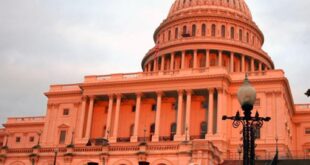BEIRUT (Reuters) – Hezbollah’s humbling of Lebanon’s U.S.-backed government has dealt a further blow to American credibility in the region less than a year after Hamas Islamists seized Gaza from Palestinian leaders supported by Washington.
The Shi’ite Islamist group’s easy military triumph over pro-government gunmen preceded this week’s visit to the region by U.S. President George W. Bush, who had cast Lebanon as a success for his declared drive for democracy in the Arab world.
That campaign was decisively tarnished in Arab eyes when Bush denounced the 2006 victory of Hamas in Palestinian polls he had promoted, and led an international campaign to isolate and deny funding to the government formed by the Islamist movement.
Three years ago, compelling images of Lebanese demonstrators demanding — and winning — the withdrawal of Syrian troops who had dominated Lebanon for 29 years provided Bush with a rare moment to relish amid the disasters of the U.S. war in Iraq.
Now the anti-Syrian ruling coalition he backs is in disarray after an 18-month-old power struggle with Hezbollah and its allies led to the violence that has cost 81 lives in the past week, nudging Lebanon closer towards sectarian civil war.
“Bush and (Secretary of State Condoleezza) Rice singled out Lebanon as a poster child of their success,” said Rami Khouri, a political analyst in Beirut. “That makes the loss even bigger.”
He said it was too early to predict how Hezbollah’s bold street offensive would play out politically, but described events so far as a “huge setback” for the United States.
“It comes as part of a cumulative process in which an American policy to confront Islamists and nationalists in Afghanistan, Iraq, Somalia, Palestine, perhaps Yemen and now Lebanon seems to have failed, at least in the short run.”
The White House has acknowledged it was “very disappointed” by the turmoil in Lebanon, once again the arena for a wider conflict pitting the United States and its Arab allies against Iran, Syria and groups they support such as Hezbollah and Hamas.
CAUGHT NAPPING
In this round at least, Hezbollah caught Washington napping, leaving Prime Minister Fouad Siniora’s government helpless.
“I don’t know what the pro-U.S. people were thinking about the extent of U.S. commitment to Lebanon,” said Hilal Khashan, a political science professor at the American University of Beirut. “Hezbollah’s actions took the Americans by surprise and they will have to scratch their heads for a response.”
The crisis erupted after Siniora’s government decided to outlaw Hezbollah’s private telephone network and to fire Beirut airport’s security chief, who is close to the Shi’ite group.
Denouncing these moves as an attack on the “weapons of the resistance” to Israel, Hezbollah went on the offensive against its Sunni and Druze foes in and around Beirut. For the first time in 20 years, it reneged on its promise to use its arsenal only against Israel, never against fellow-Lebanese.
With no clear explanation of why the cabinet embarked on a provocative course, some analysts suggest the United States and its Arab allies pushed for the hard line against Hezbollah.
“Perhaps U.S. policy to raise the pressure against Iran and its allies, and President Bush’s impending visit to the Middle East impelled the government to do something,” wrote Paul Salem, director of the Carnegie Endowment’s Middle East program.
Equally puzzling is why Iran this time gave Hezbollah approval — assuming it did — to apply its military muscle to a Lebanese political row rumbling since the 2006 war with Israel.
Perhaps, Salem speculated, it was an Iranian response to U.S. efforts to tighten sanctions, charges of Iranian meddling in Iraq and U.S. attacks on Moqtada al-Sadr’s Mehdi Army there.
Bush is to consult regional Arab allies, who are alarmed at Hezbollah’s gains, on how to help Lebanon during a tour that began in Israel on Wednesday, but his options are limited.
He has pledged more aid to Lebanon’s military to ensure its ability “to defend the Lebanese government”, yet the army has shown it is neither willing nor able to take on Hezbollah or side with the U.S.-backed government in a divided society.
COLLISION WITH REALITY
Bush’s focus on halting what he sees as a Syrian-Iranian drive to use Hezbollah “terrorists” to dominate Lebanon and threaten Israel may complicate efforts at a Lebanese compromise.
The ideology ignores the practical reality that Hezbollah and its Shi’ite and Christian allies form a political opposition bloc that represents perhaps half the Lebanese.
No solution in Lebanon is possible without some sort of accommodation that recognizes the interests of both camps — but this is anathema to the United States because Hezbollah’s core interest is to safeguard its weaponry for use against Israel.
Similarly, no reconciliation among Palestinians — seen as vital if any peace deal with Israel is to make headway — can happen without accepting Hamas as a partner, some analysts say.
Such arguments cut no ice with Washington because it shuns Hamas as a “terrorist” Islamist group that refuses to recognize Israel, forgo violence or accept past peace deals.
Failure to distinguish “criminal terrorists” like Osama bin Laden and Abu Musab al-Zarqawi from “legitimate Islamists like Hamas, Hezbollah and the Muslim Brothers” has been a recurring flaw in Bush’s Middle East policy, said analyst Khouri.
“My suggestion to the Americans is to take a whole bottle of humility pills, be realistic and understand that trying to confront Islamist-Arab nationalist groups militarily is not working well and will always generate resistance,” he added.
 Eurasia Press & News
Eurasia Press & News



